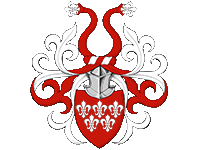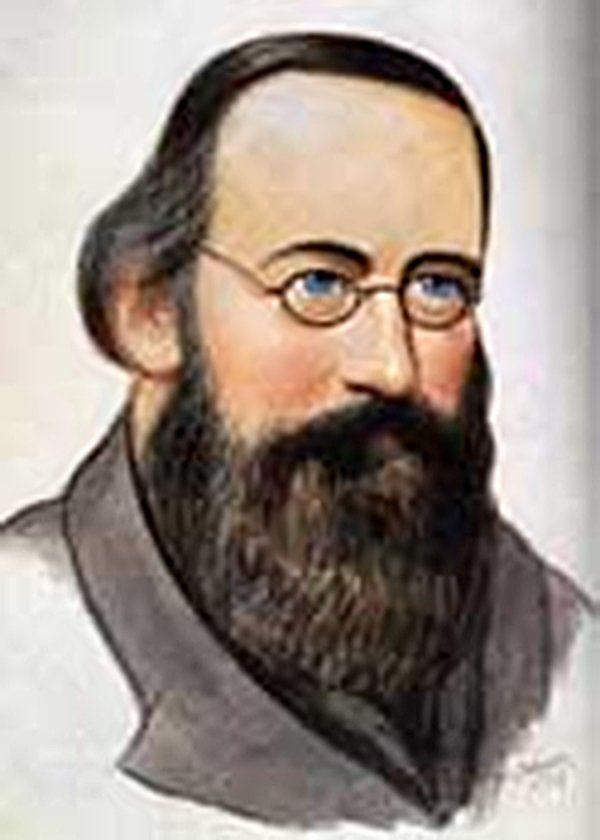Born
July 22, 1800 in Kanischa (today Kaniža, Slovenia), house 5, Catholic parish of Jahring (today Jarenina)
Godfather: Mathias Liedl, Milner [Müller]
Family branch
Vater
Michael Lorber (born around 1762, probably September 23, 1763 in the parish of Jarenina), Berghold, Weber, small farmer and band leader of the traveling musicians "Schwarzenbacher"
mother
Maria born Teutschmann or Teutschner (born around 1777), marriage 21.08.1799 in Jahring (today Jarenina, Slovenia)
brothers and sisters
- Michael Lorber (born September 7, 1802 in Kanischa), doctor, commissioner of the Carinthian state government in Greifenburg an der Drau, Upper Carinthia
- Maria Lorber (born January 6, 1805 in Kanischa)
- Maria Lorber (born March 8, 1807 in Kanischa)
- Cäcilia Lorber (born January 27, 1810 in Kanischa)
- Josef Lorber, teacher and post holder in Greifenberg, Upper Carinthia
Professions and offices
Christian mystic and writer, musician
Werdegang
Jakob Lorber was born as the first son of Michael Lorber and his wife Maria. Tautscher, a long-established Catholic farming family, was born in the village of Kanischa in Lower Styria, Jahring parish - today it belongs to the municipality of Šentilj (St. Egidi) in Slovenia - [1]. At the age of 17 he moved to Marburg an der Drau where he became a teaching assistant and organist. Soon afterwards he went to Sankt Johann im Saggautal, where he received Latin lessons from a chaplain. The chaplain advised Lorber to prepare for the priestly profession, whereupon he returned to Marburg to attend high school. After completing five classes, he continued his high school studies in Graz. He made his living there as a tutor for singing, music (piano and violin) and drawing. In 1829 he attended the "higher educational course for teachers at secondary schools" and acquired a very good certificate. [2]
After the first unsuccessful application as a teacher, Lorber gave up this plan and turned entirely to music. He composed songs and concert pieces and thus came into contact with the well-known sound poet Anselm Hüttenbrenner. During this time, Lorber met the famous violinist Niccolò Paganini, who gave him a few lessons and became a role model. [3] He also gave concerts with Franz Schubert.
Jakob Lorber read, according to his biographer Leitner, in addition to the Bible, books by Jakob Böhme, Johann Tennhardt, Emanuel Swedenborg, Johann Heinrich Jung-Stilling and Justinus Kerner. [4]
On March 15, 1840 at 6 a.m., Jakob Lorber, according to his own statements, heard an "inner voice" near his heart, which prompted him to write. From then on he dedicated his life to this voice, which he understood as the "voice of grace of the Lord Jesus Christ", and, following her "dictation", wrote down around 20,000 manuscript pages. He quit his job as a second chapel master at the Triester court, which had only just been preserved, because hearing the voice of grace was infinitely more important to him and it would have been incompatible with the luxurious well-being at court.
Lorber not only wrote himself, but dictated individual essays and even entire books to his friends, most of them Anselm Hüttenbrenner. In addition, he sometimes worked simultaneously on several works, which was documented by Hüttenbrenner in the large diaries. The manuscripts are all written in one go and contain very few changes and improvements. [5] [6]
With the start of his writing activity, Lorber was dependent on the support of his friends; among them were Graz dignitaries such as the Mayor Andreas Hüttenbrenner - Anselm's brother -, the pharmacist Leopold Cantily and the poet and Styrian state secretary Karl Gottfried von Leitner. This wrote about 1884 Lorber's biography. After Lorber's 60th year of life, his physical strength began to weaken, whereby according to his biographer Leitner, the mental continued to work without being weakened. [8] In 1864 he fell ill and had to look after the bed for three months. During this time, too, he dictated to his friends. At the beginning of spring, he recovered briefly, but finally died on August 24, 1864 of a lung disease. Lorber was buried in the St. Leonhard cemetery in Graz, [9] he was a member of the Roman Catholic Church until the end.
The manuscripts of Lorber were first distributed by hand by friends, because there was no possibility of printing in Austria. They were brought to Germany for publication, but there were also obstacles there: The book Die Jugend Jesu printed in Stuttgart in 1852 was confiscated by the official censorship. [10] His friend Johannes Busch continued to print the books, later Christoph Friedrich Landbeck (1840-1921). With the increasing distribution of Jakob Lorber's books, which only happened after his death on a larger scale, "Lorber circles of friends" formed in various places, which eventually led to a Lorber movement. [11] Jakob Lorber never received a fee for the books that were published during Lorber's lifetime, the first publishers of which were Justinus Kerner and Carl-Friedrich Zimpel, followed by Johannes Busch. [12] In total, Lorber's manuscripts - totaling around 10,000 printed pages - were printed in 25 books and many smaller scripts. [13]
After the first unsuccessful application as a teacher, Lorber gave up this plan and turned entirely to music. He composed songs and concert pieces and thus came into contact with the well-known sound poet Anselm Hüttenbrenner. During this time, Lorber met the famous violinist Niccolò Paganini, who gave him a few lessons and became a role model. [3] He also gave concerts with Franz Schubert.
Jakob Lorber read, according to his biographer Leitner, in addition to the Bible, books by Jakob Böhme, Johann Tennhardt, Emanuel Swedenborg, Johann Heinrich Jung-Stilling and Justinus Kerner. [4]
On March 15, 1840 at 6 a.m., Jakob Lorber, according to his own statements, heard an "inner voice" near his heart, which prompted him to write. From then on he dedicated his life to this voice, which he understood as the "voice of grace of the Lord Jesus Christ", and, following her "dictation", wrote down around 20,000 manuscript pages. He quit his job as a second chapel master at the Triester court, which had only just been preserved, because hearing the voice of grace was infinitely more important to him and it would have been incompatible with the luxurious well-being at court.
Lorber not only wrote himself, but dictated individual essays and even entire books to his friends, most of them Anselm Hüttenbrenner. In addition, he sometimes worked simultaneously on several works, which was documented by Hüttenbrenner in the large diaries. The manuscripts are all written in one go and contain very few changes and improvements. [5] [6]
With the start of his writing activity, Lorber was dependent on the support of his friends; among them were Graz dignitaries such as the Mayor Andreas Hüttenbrenner - Anselm's brother -, the pharmacist Leopold Cantily and the poet and Styrian state secretary Karl Gottfried von Leitner. This wrote about 1884 Lorber's biography. After Lorber's 60th year of life, his physical strength began to weaken, whereby according to his biographer Leitner, the mental continued to work without being weakened. [8] In 1864 he fell ill and had to look after the bed for three months. During this time, too, he dictated to his friends. At the beginning of spring, he recovered briefly, but finally died on August 24, 1864 of a lung disease. Lorber was buried in the St. Leonhard cemetery in Graz, [9] he was a member of the Roman Catholic Church until the end.
The manuscripts of Lorber were first distributed by hand by friends, because there was no possibility of printing in Austria. They were brought to Germany for publication, but there were also obstacles there: The book Die Jugend Jesu printed in Stuttgart in 1852 was confiscated by the official censorship. [10] His friend Johannes Busch continued to print the books, later Christoph Friedrich Landbeck (1840-1921). With the increasing distribution of Jakob Lorber's books, which only happened after his death on a larger scale, "Lorber circles of friends" formed in various places, which eventually led to a Lorber movement. [11] Jakob Lorber never received a fee for the books that were published during Lorber's lifetime, the first publishers of which were Justinus Kerner and Carl-Friedrich Zimpel, followed by Johannes Busch. [12] In total, Lorber's manuscripts - totaling around 10,000 printed pages - were printed in 25 books and many smaller scripts. [13]
The Lorber literature comprises 25 partly very extensive works, which were written by Lorber in 24 years in accordance with the "inner dictation". The manuscripts are kept by the Lorber publishing house in Bietigheim.
Since Jakob Lorber's writings were published - sometimes even during his lifetime - there has been controversy about how to classify them. The proportion, type and quality of the divine inspiration conveyed by the auditory impression is controversial even among Lorber friends. The attitude of the critics is equally controversial. These range from medical dissertations that want to have discovered chronic paranoid schizophrenia with a manic-depressive component to supporters of his writings that have united in a "Lorber movement".
Wedding and spouse
keine bekannt
children
Possibly an extramarital daughter:
In the estate act, which is in the Styrian State Archives, it is noted that the musician bequeathed his violin, a piano and several pictures and items of clothing to his “natural daughter Maria Hochegger”. However, some Lorber friends question the accuracy of this information for various reasons. The biographer Leitner, as well as other contemporary witnesses and previously made public documents, do not report anything about a natural or adopted daughter. Landbeck, however, mentions a "so-called Lorber's daughter" in his autobiography, which Lorber's manuscript from the Great Gospel of Johannes sold to a Viennese Lorber friend for 2000 guilders. [14]
Deceased
24.08.1864 in Graz
sources
- Eintrag in der Deutschen Wikipedia: https://de.wikipedia.org/wiki/Jakob_Lorber
- [1] Karl Gottfried Ritter v. Leitner: Jakob Lorber; Bietigheim: Neu-Salem, 1930, S. 7.
- [2] Leitner: Jakob Lorber. S. 9 f.
- [3] Leitner: Jakob Lorber. S. 10–12.
- [4] Leitner: Jakob Lorber. S. 12 f.
- [5] Fritz Enke: Die Original Handschriftensammlung der Neu-Salems-Gesellschaft. In: Das Wort. 6/1928, S. 137.
- [6] Karl Gottfried Ritter v. Leitner: Jakob Lorber, der steiermärkische Theosoph. ab Kapitel "Der Schreibknecht Gottes"
- [7] Leitner: Jakob Lorber. S. 34; am Beginn der Abschrift ist angegeben, dass die Biographie Lorbers von dem im November 1800 geborenen Leitner in dessen 84. Lebensjahr aufgezeichnet wurde.
- [8] Lorber Biographie von Leitner, Abschnitt Lebensabschluß
- [9] Leitner: Jakob Lorber. S. 19–21.
- [10] Hutten: Seher. 1982, S. 584f.
- [11] Leitner: Jakob Lorber. S. 44 f.
- [12] Christoph Friedrich Landbeck: Der Wahrheit-Sucher - mit Geschichte des Neu-Salems-Lichtes. Neu-Salems-Verlag, Bietigheim o. J. [Vorwort von 1920].
- [13] Leitner: Jakob Lorber. S. 14 f.
- [14] Landbeck: Wahrheitssucher, S. 38.







